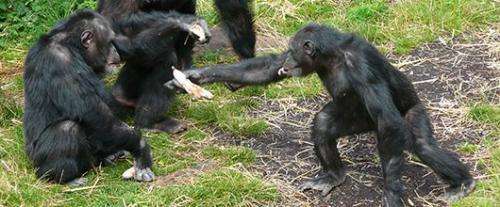Caring and sharing is monkey business

Chimpanzees, much like children, can learn to be kind by observing and experiencing the kindness of others, according to new research by the University of St Andrews.
The study – published by Nature's Scientific Reports – offers new evidence of the evolutionary roots of kindness in humans and non-human primates.
The international research project was led by psychologists Professor Andrew Whiten and Dr Nicolas Claidiere of the University of St Andrews, and Dr Nicola McGuigan of Heriot-Watt University in Edinburgh. The study shows for the first time that kindness in young children and non-human primates such as chimpanzees can be influenced by experiencing and learning from the 'prosocial' behaviour of peers. Contrary to earlier findings, the study indicates that in certain conditions our close primate relatives display similar behaviour to humans.
Professor Whiten, a pioneer in the field of evolutionary and developmental psychology, said:
"A regard for the welfare of others is seen as a cardinal human virtue. By contrast, several recent scientific studies have concluded that the same dispositions are lacking in our closest living primate relatives. The results of our research provide the first evidence that both children and chimpanzees share common traits of altruism that are learned as a direct result of experiencing the kindness of others."
In the new research, Professor Whiten and his colleagues studied and compared the prosocial actions of children aged between 4 and 8 years and adults, with those of chimpanzees and capuchin monkeys.
Prosocial behaviour is a voluntary social behaviour which benefits other individuals or society and is expressed in positive traits such as helping, sharing and co-operating. It is considered to be central to the well-being of diverse social groups and communities, offering immediate benefit and often inspiring mutual exchange in the future. Motivating factors for prosocial actions include empathy, which is recognised to have deep evolutionary roots, altruism, practical considerations and self-interest.
The study involved pairing participants within each research species and assessing individual responses to accessing food rewards under a range of controlled conditions. The prosocial options included whether participants provided rewards to others and the quality of the rewards.
The results showed a progressive development of prosocial behaviour, from its absence in the youngest children and capuchin monkeys in certain conditions, to its full expression in human adults who gave their partner a more preferred reward even when they could only receive the less preferred reward.
After some children and chimpanzees who did not show prosocial behaviour were partnered with others who showed generous behaviour towards them, they were later found to act more kindly themselves and were more likely to reward others.
Professor Whiten was supported in his research by Nicolas Claidière and Emily Messer from the University of St Andrews and colleagues from Edinburgh and the USA.
Professor Whiten continued:
"We believe our study is the first to demonstrate that the prosocial behaviour of humans and non-human primates is shaped by the everyday social actions of those around them. Kindness may thrive, evolve and inspire when helping, sharing or donating are part of the cultural experience."
The chimpanzees and capuchin monkeys were studied at the University of Texas and the University of St Andrews 'Living Links to Human Evolution' Research Centre in Edinburgh Zoo.
More information: Claidiere, N., Whiten, A., Mareno, M.C., Messer, E.J.E., Brosnan, S.F., Hopper, L.M. Lambeth, S.P., Schapiro, S.J. & McGuigan, N. (2015). "Selective and contagious prosocial resource donation in capuchin monkeys, chimpanzees and humans." Scientific Reports, 5: 7631. DOI: 10.1038/srep07631
Journal information: Scientific Reports
Provided by University of St Andrews



















